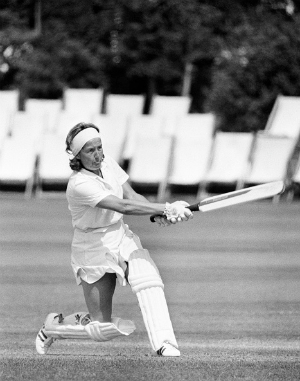Cricket is a beautiful game; what makes it more beautiful is not just what happens on the field but also what revolves around it. Rachael Heyhoe-Flint was not a legend who made remarkable records in the middle, but she changed the game for women. What we have now for women’s cricket, we owe a lot to her and there is no better day than to think about the legend on her birth anniversary.
Rachael Heyhoe-Flint, a former England captain, was born on June 11, 1939. Heyhoe-Flint was an accomplished cricketer in her time, and she went on to become the driving force behind the inaugural Women’s World Cup, as well as a key figure in the evolution of women’s cricket.
For more than a generation, Rachael Heyhoe-Flint embodied women’s cricket in England, giving it credibility and a better profile than it had before she played. She continued to promote the sport after she retired, because of her strong media presence and personality.
She was one of the best batswomen in the world, capable of both reckless attack and tenacious defense. In 1966, she took over as England captain and went undefeated in six series. Her biggest achievement was helping England to win the 1973 World Cup, not least since she was essential in establishing the competition – two years before the men.
At the age of 37, she batted for 521 minutes against Australia at The Oval, scoring 179 runs and earning England a series tie. She had hit the first six in a women’s Test on the same ground against the same opposition thirteen years before. She held the Test record for runs scored when she retired.
At the time when cricket was just played by men and they were the only players considered for prestigious awards, Flint had some other thoughts about it. The walls of one of the most powerful forts of male privilege were not demolished overnight. Women were not allowed to join MCC, the club that controls Lord’s, for another two decades of lobbying, and Heyhoe Flint was at the vanguard of that change. She entered the debate by applying for membership in 1991, and the campaign that followed reflected her strengths in many ways: she was tenacious, persuasive, and passionate.
Given the lack of coverage of women’s cricket in the mainstream media in the mid-1970s, Heyhoe Fl
int had become one of Britain’s most well-known sportswomen by the mid-1970s, a testament to her flair for publicity. She was the first woman to be inducted into the International Cricket Council’s Hall of Fame, which she received in 2010. However, she was made a Conservative life peer in 2011 in honor of her career as a charity fundraiser. She was made an MBE in 1972 and an OBE in 2008.
Her impact was not just on the England team but also on women’s cricket worldwide which helped in getting attention, sponsorships, and training for women’s sports similar to that of men. That might be Heyhoe Flint’s greatest legacy.



Recent Comments